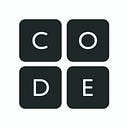We know millions of teachers and students around the world trust us every day with their personal information on Code.org. In a world where keeping information safe online is more important than ever, we don’t take that responsibility lightly!
We’ve taken a number of steps and enacted policies to ensure your information is safe across our site, and you’ll always be the first to know when we update or change these policies. We’re also proud to receive one of the highest privacy ratings from Common Sense Media, which sets the gold standard for strong privacy protections. The Common Sense Privacy Program evaluates popular education technology applications and services currently used by tens of millions of students in classrooms across the country, and Code.org stood out for its outstanding commitment to privacy.
“Code.org’s privacy practices have received one of our highest overall scores through our privacy evaluation process and represent the top tier of companies with the most robust privacy and security protections for student data,” said Girard Kelly, counsel and director of Common Sense’s Privacy Review.
Here’s what else we’re doing to protect your private information:
Students can learn on Code.org without any login. Our most popular tutorials are all available without requiring student login of any sort, for convenience as well as for privacy.
We only store the data we actually need. Sometimes companies collect extraneous data, even if there’s not an immediate use for it. This information is vulnerable to attacks and accidental leaks, so for this reason, we intentionally choose NOT to store email addresses for Code.org Student accounts or phone numbers used in our send-to-phone feature. We collect the bare minimum required to use our platform because we know the data we do not store cannot be stolen from us!
We don’t collect student email addresses. Ever. Millions of students around the world use Code.org everyday to learn computer science. But to keep students safe, we designed our login so that we never even receive student email addresses. This also means students will never receive an email directly from us, and there is no student contact information to sell to third-party sites. We established ourselves as a nonprofit so our mission and your trust will not be in conflict with a for-profit motive.
As an added precaution, teachers can sign students up using just first names or nicknames.
We’re serious about privacy because we teach it in our curriculum. Our privacy policy is very “wordy” because we teach privacy in our actual lessons. We review every piece of data that we collect and explain why we need it, as well as the mechanisms we use to keep it safe (we’ve got a whole explainer on the one-way hash function, for example). We also have Common Sense lessons about how to be safe online embedded in our courses to give students the most up-to-date information. Our approach to privacy is different than other platforms because we view it as our responsibility to not only safeguard your data, but to teach you how we’re doing it.
We’ll tell you when we make a mistake. If there is a data issue, we’ll tell you exactly what was shared, with whom, how and what we’re doing about it.
We take privacy seriously, and there’s much more to our policy! You can read our entire privacy policy here.
-Marina Taylor, Code.org
